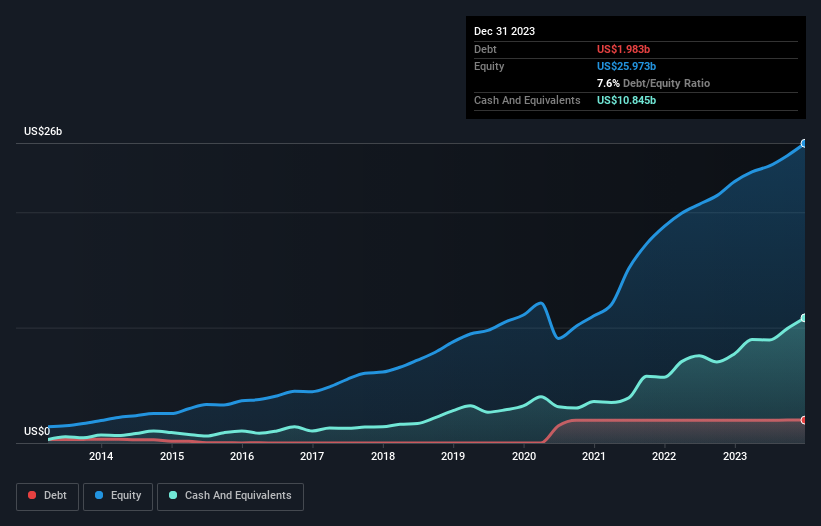Is Regeneron Pharmaceuticals (NASDAQ:REGN) A Risky Investment?
Howard Marks put it nicely when he said that, rather than worrying about share price volatility, 'The possibility of permanent loss is the risk I worry about... and every practical investor I know worries about.' When we think about how risky a company is, we always like to look at its use of debt, since debt overload can lead to ruin. We note that Regeneron Pharmaceuticals, Inc. (NASDAQ:REGN) does have debt on its balance sheet. But the more important question is: how much risk is that debt creating?
When Is Debt A Problem?
Debt is a tool to help businesses grow, but if a business is incapable of paying off its lenders, then it exists at their mercy. Part and parcel of capitalism is the process of 'creative destruction' where failed businesses are mercilessly liquidated by their bankers. However, a more frequent (but still costly) occurrence is where a company must issue shares at bargain-basement prices, permanently diluting shareholders, just to shore up its balance sheet. Of course, plenty of companies use debt to fund growth, without any negative consequences. The first thing to do when considering how much debt a business uses is to look at its cash and debt together.
See our latest analysis for Regeneron Pharmaceuticals
What Is Regeneron Pharmaceuticals's Net Debt?
As you can see below, Regeneron Pharmaceuticals had US$1.98b of debt, at December 2023, which is about the same as the year before. You can click the chart for greater detail. However, its balance sheet shows it holds US$10.8b in cash, so it actually has US$8.86b net cash.
A Look At Regeneron Pharmaceuticals' Liabilities
We can see from the most recent balance sheet that Regeneron Pharmaceuticals had liabilities of US$3.42b falling due within a year, and liabilities of US$3.68b due beyond that. Offsetting these obligations, it had cash of US$10.8b as well as receivables valued at US$5.67b due within 12 months. So it can boast US$9.41b more liquid assets than total liabilities.
This short term liquidity is a sign that Regeneron Pharmaceuticals could probably pay off its debt with ease, as its balance sheet is far from stretched. Simply put, the fact that Regeneron Pharmaceuticals has more cash than debt is arguably a good indication that it can manage its debt safely.
But the bad news is that Regeneron Pharmaceuticals has seen its EBIT plunge 15% in the last twelve months. If that rate of decline in earnings continues, the company could find itself in a tight spot. The balance sheet is clearly the area to focus on when you are analysing debt. But ultimately the future profitability of the business will decide if Regeneron Pharmaceuticals can strengthen its balance sheet over time. So if you want to see what the professionals think, you might find this free report on analyst profit forecasts to be interesting.
Finally, while the tax-man may adore accounting profits, lenders only accept cold hard cash. Regeneron Pharmaceuticals may have net cash on the balance sheet, but it is still interesting to look at how well the business converts its earnings before interest and tax (EBIT) to free cash flow, because that will influence both its need for, and its capacity to manage debt. Over the most recent three years, Regeneron Pharmaceuticals recorded free cash flow worth 75% of its EBIT, which is around normal, given free cash flow excludes interest and tax. This free cash flow puts the company in a good position to pay down debt, when appropriate.
Summing Up
While it is always sensible to investigate a company's debt, in this case Regeneron Pharmaceuticals has US$8.86b in net cash and a decent-looking balance sheet. And it impressed us with free cash flow of US$3.7b, being 75% of its EBIT. So we don't have any problem with Regeneron Pharmaceuticals's use of debt. There's no doubt that we learn most about debt from the balance sheet. However, not all investment risk resides within the balance sheet - far from it. We've identified 1 warning sign with Regeneron Pharmaceuticals , and understanding them should be part of your investment process.
If, after all that, you're more interested in a fast growing company with a rock-solid balance sheet, then check out our list of net cash growth stocks without delay.
Have feedback on this article? Concerned about the content? Get in touch with us directly. Alternatively, email editorial-team (at) simplywallst.com.
This article by Simply Wall St is general in nature. We provide commentary based on historical data and analyst forecasts only using an unbiased methodology and our articles are not intended to be financial advice. It does not constitute a recommendation to buy or sell any stock, and does not take account of your objectives, or your financial situation. We aim to bring you long-term focused analysis driven by fundamental data. Note that our analysis may not factor in the latest price-sensitive company announcements or qualitative material. Simply Wall St has no position in any stocks mentioned.

 Yahoo Finance
Yahoo Finance 
